Probiotic Ginger Beet Kvass Drink Recipe
When it comes to fermented foods, fermented drinks like kombucha are the little darling of the ferment world right now. Easily one of the most mainstreamed health foods, there are tons of brands making kombucha and even more people taking on making fermented drinks themselves. Though kombucha isn’t my favorite, I do have favorite, and it’s ginger beet kvass. Stay with me here! It’s much easier to make than kombucha, it’s cheap, and dare I say, it may be even healthful of a probiotic drink than kombucha.
Why have fermented foods?
So, what’s the deal with all of this probiotic/fermentation buzz these days? It may be trendy now, but fermented foods date way, way back beyond the packages that we find in stores today. Before refrigeration, fermenting foods was a way to keep them fresh while also adding the benefit of probiotics. Fermented foods as a traditional food rather than a hot health trend, and probiotics are a much needed part of our diet.
Probiotics help maintain and refresh our gut flora which is necessary to maintain proper gut health, and just good health in general. Unbalanced gut flora can lead to a myriad of problems from autoimmune disease, digestive dysfunction, and even changes in our mood. We’re born with a certain amount, but our ancestors taught us that we need to keep replenishing our gut flora with fresh probiotics. But wait, can’t we just take a probiotic pill and call it a day? Well, it’s said that one jar of a fermented food like sauerkraut is equal to 8 jars of probiotic pills! Fermented foods are more traditional, cheaper, and more probiotic rich.
Why ginger beet kvass?
So, what makes beet kvass so special? Not only does it actually taste surprisingly delicious, but beet kvass packs more of a punch than just your average kombucha. Not only is it fermented, thus probiotic rich, but it’s great for both liver and gallbladder health.
In our low-fat/poor quality fat centric world, many of us fall victim to poor fat digestion caused by our gallbladder getting lazy. The bile within our gallbladder isn’t needed if we’re not consuming fat, or consuming bad fats… it gets viscous and doesn’t flow well even when we switch over to a good quality fat diet. Beets help to naturally get the bile moving, thus improving fat digestion.
Not only does improving fat digestion take away digestive distress, but it also helps with satiation, nutrient absorption and cures tons of mystery symptoms. Have dry hands all of the time? Blame poor fat digestion. What about bloating? Most likely poor fat digestion. The list goes on, and on as so many of us suffer from it.
The ginger also helps aid in digestion, and adds great flavor!
Ginger Beet Kvass Recipe
Ingredients
- 1 large purple beet
- 1 large golden beet (could sub for another purple… I think the golden helps enhance the flavor)
- 1 tbsp fresh grated ginger
- 1 tablespoon sea salt
- 1/4 cup of juice from sauerkraut
- Enough water to fill the half gallon jar (varies by how large your beets are)
Instructions
- Chop the beets into large cubes and add to the bottom of the jar along with the ginger into a half gallon jar
- Add the juice from the sauerkraut, water, and sea salt
- Take a clean kitchen cloth and cover the mouth of the jar, securing it with a rubber band
- Keep in a cool dry place for at least 3 days. You’ll see the top of the jar will start to fizz a bit.
- Remove the cloth, and add the lid.
- Refrigerate, and enjoy!
How do you drink it?
I probably wouldn’t drink the entire thing at once, just as I’d want to save it! I drink a few sips, or a half of a small glass daily. It has enough flavor to drink by itself and is so much better than just taking a probitoic daily.
I also find that if I eat a high fat meal and start to ever feel discomfort, I take a swig of this and it aids in any discomfort.
What’s your favorite fermented food?
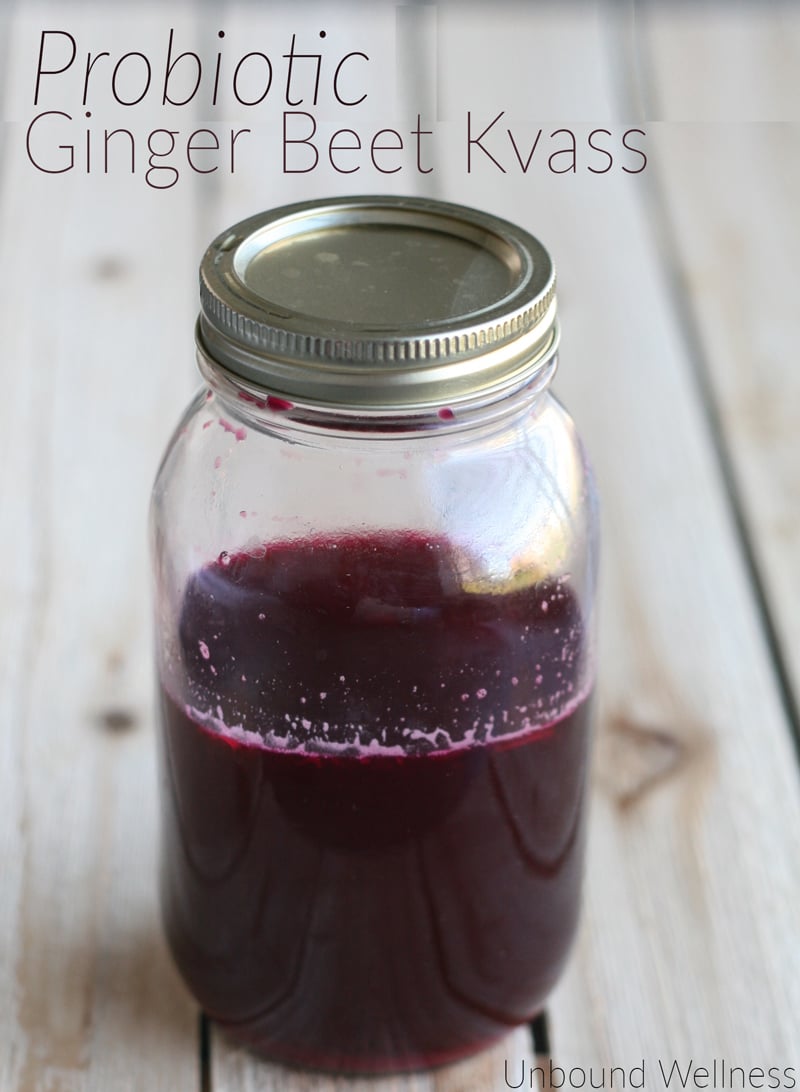

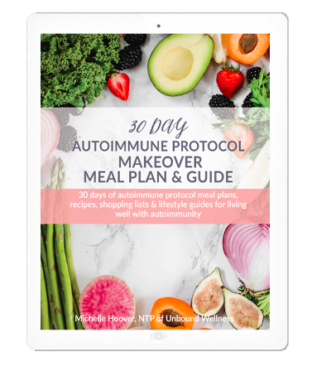

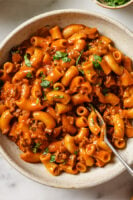
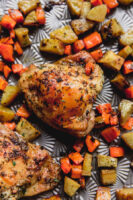
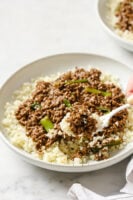
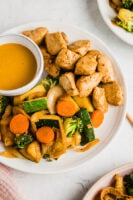
Pingback: 5 Foods to Eat Weekly to Support Gut Health - Unbound Wellness
I have never made anything fermented yet,for fear of doing it wrong and getting sick. so I have a few questions. This beet kvass seems so easy. Can a cool dry place be in refrigerator? So you just drink the liquid from it? do you also eat the beets? And can the sauerkraut be any store bought sauerkraut? This looks beautiful and I have both red and golden beets right now I will just need to get the sauerkraut.
Hi, Beth! It really is pretty easy 🙂 that’s why I love it! Typically fermentation needs to be done outside of the fridge and then added once it’s done. That way, the bacteria are able to grow. I’ve never eaten the beets, but I assume you could! I just drink the liquid. You can use any sauerkraut that’s raw and bought in the refrigerated section of the store. Hope that helps!! Enjoy 😀
thank you
Pingback: How To Maintain Gut Health At Every Stage of Healing - Unbound Wellness
Pingback: 5 Ways to Improve Your Gut Health... Right Now! - Unbound Wellness
i’m excited to try this! do you peel the beets?
will the beets break down or they need to be removed from the liquid after 3 days?
Hey, Amanda!
Peeling the beets is optional if they’re organic. If they are indeed organic, you can just give them a good wash and keep the skin on. If not, I’d go ahead and peel them.
The beets stay intact, and are ready to be removed after the three days. One trick you can try is to remove the liquid and keep the beets in the jar and make another batch of kvass 🙂 You can reuse the beets once to reduce waste, just like with bone broth!
Enjoy!! 🙂
awesome tip!! thank you!
Pingback: 50 Ways To Heal Your Gut & Be a Gut Healing Goddess - Unbound Wellness
Pingback: Probiotic Ginger Beet Kvass Drink Recipe – onlinecelebritynews
I’ve seen kvass done two ways, fermenting with tight lid on and your way. I usually do the tight lid. Can you explain the benefits of using cheesecloth while fermenting. Thanks!
It just helps it breathe 🙂
Pingback: The Best Foods For Hashimoto's Disease - Unbound Wellness
Just wondering about fermenting, does the container you ferment your food in have to be glass? Is plastic acceptable?
Glass works best 🙂
What to do with the beets after straining the kvass? Eat them?
I haven’t tried to eat them, but I’ve heard that you can reuse them for other kvass. I usually just consider them fully used and discard them.
I’ve done the regular beet kvass, but this is SO much better. Thank you for sharing
Looks great! Could you use pickle juice from fermented pickles like Bubbies?
I’m not sure! But you could always try it out!
Can I use a rubber glove to cover the jar as it ferments? Ido not have a fancy lid.
Thank you
I actually haven’t ever tried!